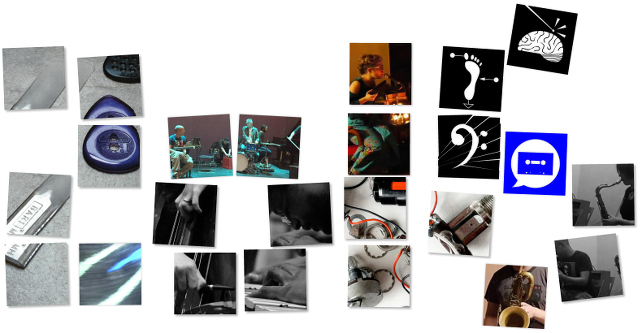
Original photographs/images © 2015 Han-earl Park; © 2015 Translating Improvisation; © 2015 Peter Fay; © 2015 Caroline Pugh; © 2015 65Fen Music Series; and © 2015 Michael Foster.

Original photographs/images © 2015 Han-earl Park; © 2015 Translating Improvisation; © 2015 Peter Fay; © 2015 Caroline Pugh; © 2015 65Fen Music Series; and © 2015 Michael Foster.
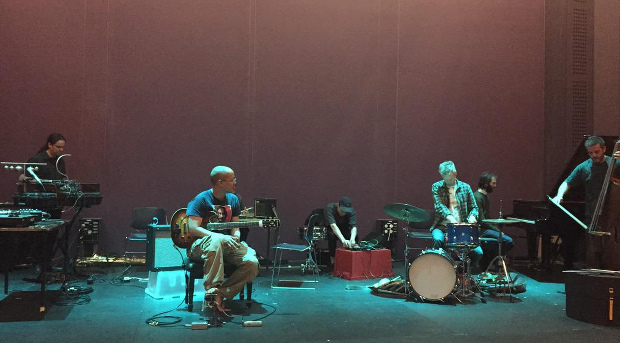
Simon Rose: “Did you know how loud you were?”
Han-earl Park: “Oh. Yes.”
Rose: “I thought you did.”
Thoughts and questions in response to Translating Improvisation’s symposium back in May from the POV of an institutionally unaffiliated, sometimes teacher, amateur scholar and anthropologist [previous twitter transcripts…]. Below the fold is an unedited twitter transcript of my observations from Just Improvisation. My original observations came in the form of tweets (some written ‘live’, most posted subsequently) via @hanearlpark that spanned the first panel discussions, Ellen Waterman’s keynote presentation, concert performances by Okkyung Lee and Maria Chavez, the Deep Listening Workshop with Pauline Oliveros, and the workshop-performance which forms the main subject of my discussions.
My questions and observations are indebted to discussions with @franzschroeder, @wildsong, @tomarthursmusic, @pauljstapleton, @MortButane, @olivep, @davekanemusic, @zeittraumism, @nickreynoldsatp and @JoshSinton both on- and off- the twitterverse.
The rants (and typos), however, are entirely my own 😉
May 29: Let’s start this w/ informal, visible demographic survey (a la #isim2014 #amspittsburgh #rsa2014)… #amateuranthropology #justimprovisation
May 29: …Suits. Lots* of suits. #amateuranthropology #justimprovisation
May 29: …* ‘Lots’ may be relative.** #amateuranthropology #justimprovisation
May 29: …** ‘Relative’ may speak more to the prejudices of the observer. #amateuranthropology #justimprovisation
May 29: ‘Adversity’ noun: “difficulties; misfortune”… #justimprovisation
May 29: …Potential tripping hazard in interdisciplinary meetings? possible misunderstanding(s) (creative or otherwise)? … #justimprovisation
May 29: …What is, for eg, the relationship btwn ‘adversity’ and ‘struggle’? #justimprovisation
May 29: …‘Adversity’ is not a term afaik improvisers enroll in their discussions, but ‘struggle,’ yes, often, maybe always. #justimprovisation
May 29: …Also ‘difficulty,’ ‘problematic,’ ‘risk’—difficult/problematic terms w/ differing creative/social ramifications. #justimprovisation
May 29: …false friends? I doubt these terms say much about the specifics of the creative or the social… #justimprovisation [1/2]
May 29: …—or their corresponding discourses—but it may be tempting to draw simple correlations. #justimprovisation [2/2]
May 29: …Like I said, potential tripping hazards. #mistakenembrace #justimprovisation
May 29: “Start to grapple with that fluidity.” #justimprovisation
May 29: ‘Proceduralized.’ Good word. Potential #artspeak right there. #linguisticdetritus #randomactsofpoetry #justimprovisation
May 29: “We’ve seen an 18% increase…” I’d love to write program/liner notes w/ this language. #technocracy #artspeak #justimprovisation
May 29: …How do we reconcile the need for ‘fluidity’ when the rhetorical justification uses… #linguisticdetritus #justimprovisation [1/2]
May 29: …such technocratic, bureaucratic language? #linguisticdetritus #justimprovisation [2/2]
May 29: “Risk”; that word again. #artspeak #linguisticdetritus #justimprovisation
May 29: Improvisation as an “unruly domain”. #justimprovisation
May 29: …Improvisation as a ’domain’? as a ‘site’? (Not an act?) #performance #identity #sociality #justimprovisation
May 29: Didn’t multiculturalism die at the hands of diversity? … #genuinequestion #justimprovisation
May 29: …or at least did not diversity explode the problematics (and necessary violence) of multiculturalism? #justimprovisation
May 29: “Musically satisfying ensemble.” ‘Satisfying’ #hmm By what criteria? #justimprovisation
May 29: ‘Recognition’ as the mechanism of identity (w/ minorities)? What about whiteness? heteronormativity? #hegemony #othering #justimprovisation
May 29: Equality = refusal to recognize difference. #justimprovisation
May 29: ‘Authentic self’? Is there the trap of essentialism there? #justimprovisation
May 29: Is the mechanism of improvisation based on exchanges? #genuinequestion #justimprovisation
May 29: I’ll ask this again for emphasis: Is exchange the primary/necessary/root mechanism of improvisation? #genuinequestion #justimprovisation
May 29: “Identities are always contingent.” Yes. This. #justimprovisation
May 29: Do the musical terms dissonance/harmony correspond to social/power relationship? … #justimprovisation
May 29: …or are we falling back on (liberal humanist) bad habits of old musicology? #justimprovisation
May 29: “Unvoicing of ulterity.” #justimprovisation
May 29: I don’t buy the distinction btw ‘traditional’ and ‘creative’ improvised musics. #idiom #tradition #creativity #justimprovisation
May 29: …pretty much said the same in a discussion with @tomarthursmusic afterwards. #justimprovisation
May 29: More thoughts: everytime I see OL perform, I think, damn; she’s better than the rest of us put together. #justimprovisation
May 29: Much transducer based music or #soundart would be improved by judicious enrolling of highpass filters. #impedance #justimprovisation
May 29 [in reply to…]: .@nickreynoldsatp I just don’t buy the one-on-one correspondence of musical and social dissonance/harmony. Instead… #justimprovisation [1/2]
May 29: .@nickreynoldsatp …it strikes me that _making_ the distinction btwn dissonance & harmony is the political act. #justimprovisation [2/2]
May 31: 0. Some more thoughts from the #justimprovisation symposium coming up…
May 31: 1. Find myself (my accident, of course) sitting next to @olivep during the Deep Listening workshop… #justimprovisation
May 31: 2. …and learned that I can not only listen thru the soles of my feet, but… #justimprovisation #body #physiology #listening
May 31: 3. …that I can triangulate the source of the vibration w/ two feet. Stereo! #justimprovisation #body #physiology #listening
May 31: 4. During the course of discussions, an improvising ensemble is frequently compared to that of a family… #justimprovisation
May 31: 5. …but escaping familiar relations are by degrees of magnitude so much harder than leaving an ensemble. #justimprovisation
May 31: 6. I am, however, reminded of the oft used terms ‘leader’ & ‘collective’ in the context of improvising micro-societies. #justimprovisation
May 31: 7. And tho we often idealize one form over another, ‘leader’ & ‘collective’ denote only 2 possible ways of organizing… #justimprovisation
May 31: 8. …each problematic, each utopian, in their way; neither quite fully descriptive of the dynamics of social play. #justimprovisation
May 31: 9. Leaders: such strong personalities (egos?) holding ensembles together… #justimprovisation
May 31: 10. …Ellington? Mingus? Bley? Guy? Mitchell? Paternalistic, nurturing, playful, autocratic, managerial, or bullying… #justimprovisation
May 31: 11. …Were we waiting for (or in need of) the ‘leader’ (such as @olivep) in the #justimprovisation ensemble…?
May 31: 12. In contrast to Call Them Improvisors! in 2011 in which we all bowed down to EP? #justimprovisation
May 31: 13. (Aside: but there may be no leaders, just those willing to be lead. We can too easily mistake effect for cause.) #justimprovisation
May 31: 14. Collective: idealized, utopian, but how do these work? How does collectivism work w/out violence to diversity…? #justimprovisation
May 31: 15. …afaik, closest to coop/‘family’ improvised musics was the AEC. But that ensemble emerged from Mitchell’s group… #justimprovisation
May 31: 16. …Felt as tho the #justimprovisation group desired (or felt we _should_ desire) a collective, but we were so polite (and yet so violent)…
May 31: 17. “Fuck you.” Someone says during the post-workshop discussions. ‘Yeah,’ I think, ‘exactly: “fuck you.”’ #justimprovisation
May 31: 18. Be back later with more thoughts on violence, alliances, autocracy and sociality coming up. #justimprovisation
Jun 24: 19. More thoughts on violence, alliances, autocracy and sociality from @translat_improv’s #justimprovisation symposium coming up…
Jun 24: 20. During #justimprovisation an improvising ensemble is frequently compared to that of a family… http://twitter.com/hanearlpark/status/604953995489234944
Jun 24: 21. …but familial relationships often seem less about choice of partners than, generally, a musical ensemble… #justimprovisation
Jun 24: 22. …we choose our bands in a way we can’t always choose our families (or we get paid)… #justimprovisation
Jun 24: 23. …that aside, are dysfunctions similar in both groups? Maybe (but how you solve/escape them are radically different). #justimprovisation
Jun 24: 24. What happens in an ensemble is brought together w/ radically different agenda, desires, skills, character, or power…? #justimprovisation
Jun 24: 25. …And what happens when those social/musical dissonances/discords are not discussed…? #justimprovisation http://twitter.com/hanearlpark/status/605081182133465088
Jun 24: 26. I want to unpack this (realize this is prob directed at a certain guitarist): http://twitter.com/davekanemusic/status/605734075446513665 #justimprovisation
Jun 24: 27. …I had certain problems w/ the amplified, steady-state ‘drone’ proponents in the #justimprovisation ensemble. I had difficulty…
Jun 24: 28. …hearing the unamplified string players in the #justimprovisation group. (It seemed to me, in such a large ensemble, the…
Jun 24: 29. …only ones who should have free license to play continuous sustained gestures were the unamplified strings/flute)… #justimprovisation
Jun 24: 30. …the rest of us would have to be more careful (we could be loud, but those gestures would have to be short)… #justimprovisation
Jun 24: 31. …talking to one of the drone proponents during the break, he responded that he wanted everyone to play drones… #justimprovisation
Jun 24: 32. …so the question: http://twitter.com/hanearlpark/status/605080336385617921 #justimprovisation
Jun 24: 33. …favorite pt of #justimprovisation may have been @MortButane (musical) response to Bennett Hogg: unexpected, oblique, left-field…
Jun 24: 34. …different, idiomatically discordant; recontextualizing Hogg’s playing (never to be heard the same way again)… #justimprovisation
Jun 24: 35. …how does one catalyze such (transformative) interactions and choices…? #justimprovisation
Jun 24: 36. …catalyze w/out ‘fixing’ the group (reminded of @JoshSinton: he’s not in the business of ‘saving’ an improvisation)… #justimprovisation
Jun 24: 37. When #justimprovisation group w/out the full complement of players (sans many quieter voices) start our performance in the afternoon
Jun 24: 38. …the ensemble launches into full-scale drone-works. I give up. It’s prob. unforgivable, but I walk off stage… #justimprovisation
Jun 24: 39. …I remember thinking: ‘I do not want to be part of this drone warfare.’ (ironic considering what is to follow)… #justimprovisation
Jun 24: 40. …If I have a problem w/ how those drones were articulated, it wasn’t the loudness of it as such, but how it subsumed… #justimprovisation
Jun 24: 41. …how it absorbed diversity and made it part of its identity. Which may be a kind of collectivism, but… #justimprovisation
Jun 24: 42. …not a collective I wanted to be part of. #justimprovisation
Jun 24: 43. Feel it’s disrespectful to walk off stage, but done it x2 since an experience some years ago: http://improvisingguitar.blogspot.ie/2007/02/mob-behavior-and-hegemonic-impulse.html #justimprovisation
Jun 24: 44. …If leaving the stage is unforgivable, then rejoining it seems like, at best, very poor manners… #justimprovisation
Jun 24: 45. …Essentially doing a pick’n’mix on what you decide to participate it. Where is the collective? collectivism? family? #justimprovisation
Jun 24: 46. In retrospect, going back on stage was a mistake, but once there, tried 2do what is the best role for the e. guitar… #justimprovisation
Jun 24: 47. …nudge, push and pull, and catalyze the existing elements that are ‘desirable’… #machiavellian?… #justimprovisation
Jun 24: 48. …but when those totalizing drones started up again for the umpteenth time, I exercised the nuclear option… #justimprovisation
Jun 24: 49. …Nuclear option? I floored it: volume pedal toe down, playing at eleven… #justimprovisation? or #unjustimprovisation?
Jun 24: 50. …Nuclear option: did I say evoking drone warfare was ironic? http://twitter.com/hanearlpark/status/613656187708510208 #justimprovisation
Jun 24: 51. …I did American Foreign Policy—indiscriminate, “bomb them back into the Stone Age”—on the collective… #justimprovisation
Jun 24: 52. …second time I’ve ever exercised the nuclear option, and, unlike last time, I’m _certain_ it was wrong wrong, wrong… #justimprovisation
Jun 24: 53. …Despite what @wildsong @olivep said, feel my response really was… immoral? Maybe. Unethical? Probably. Wrong? Wrong… #justimprovisation
Jun 24: 54. …Deniz Peters: “You autoerotic guitarist, you.” Ironic following statements about the non-semiotic nature of music? #justimprovisation
Jun 24: 55. …Simon Rose: “Did you know how loud you were?” “Oh. Yes.” “I thought you did.” #justimprovisation
Jun 24: 56. …Should someone ask for one (not that I expect anyone to), I would give my unconditional apology for what I did… #justimprovisation
Jun 24: 57. …but my question is: given the (latent/overt/potential of) violence in the ensemble (as discussed in this thread)… #justimprovisation
Jun 24: 58. …what _should_ I have done? #justimprovisation
Jun 26 [in reply to…]: .@JoshSinton No. Didn’t expect them to, but… your Q gets me asking who they should have apologized to (if at all)… #justimprovisation [1/2]
Jun 26: .@JoshSinton …to those whose voices got absorbed into the hive, or those who had difficulty hearing those voices? #justimprovisation [2/2]
Jun 26 [in reply to…]: .@JoshSinton Good question. Hmm… maybe no apologies are necessary (just some group counseling). #justimprovisation
Jun 26: .@JoshSinton As for my initial statement, for me, it’s the fact that I dropped (the musical equivalent of) nukes… #justimprovisation [1/2]
Jun 26: .@JoshSinton …wrong is wrong regardless of the reasons that compelled it. #justimprovisation [2/2]
10–15-22: elements of this transcript has become part of my article in The Sampler.
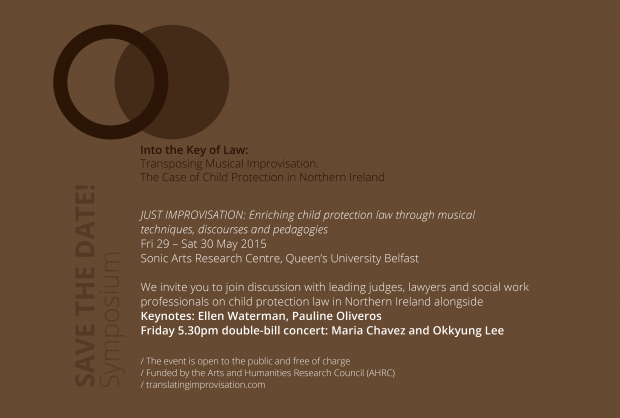
May 29 and 30, 2015: as previously posted, I’ve been invited to participate in Just Improvisation: Enriching child protection law through musical techniques, discourses and pedagogies. See below for the program including the list of musicians involved. The symposium, organized by Translating Improvisation, takes place at the Sonic Arts Research Centre (Queen’s University, Belfast, N. Ireland). Admission is free, and the event is open to the public.
See the performance diary for up-to-date info. [Translating Improvisation page…]
2:00pm: Welcome & Introduction (Paul Stapleton and Sara Ramshaw)
2:15pm: Panel 1: ‘Child Protection as Social Practice: Challenges and Possibilities’
Chaired by: Marcella Leonard (Independent Social Worker) with: Denise McBride QC (Senior Barrister) and John Devaney (Senior Lecturer at Queen’s University Belfast – School of Sociology, Social Policy and Social Work)
3:45pm: Coffee/Tea Break
4:00pm: Keynote 1: Ellen Waterman, ‘Improvisation and the Audibility of Difference’
5:00pm: Wine Reception
5:30pm: Double-bill concert: Okkyung Lee and Maria Chavez
9:45am: Coffee/Tea
10:00am: Deep Listening Workshop (led by Pauline Oliveros)
11:00am: Parallel Workshops: Musical Improvisation / Hydra (Legal Improvisation)
Improvisation workshop musicians: Paul Stapleton, Adnan Marquez-Borbon, Maria Chavez, Okkyung Lee, Pauline Oliveros, Ellen Waterman, Tom Arthurs, Matt Bourne, Dave Kane, Steve Davis, Phil Smyth, Simon Rose, Michael Speers, Dennis Peters, Han-earl Park, Ed Devane, Bennett Hogg and Rachel Austin
1:00pm: Lunch break
2:00pm: Panel 2: Informal performances and open discussion about workshops
3:00pm: Keynote 2: Pauline Oliveros, ‘The Ethics and Practice of Listening’
4:00pm: Coffee/Tea
4:15pm: Panel 3 & Plenary Discussion: ‘Imagining the Future’
Chaired by Georgina Born (Professor of Music and Anthropology, Oxford) with: Siobhan Keegan QC (President of the Family Bar Association of Northern Ireland)
5:15pm: Closing Remarks (Sara Ramshaw and Paul Stapleton)

May 29 and 30, 2015: I am honored and excited to be invited to participate in Just Improvisation: Enriching child protection law through musical techniques, discourses and pedagogies. The symposium, organized by Translating Improvisation, takes place at the Sonic Arts Research Centre (Queen’s University, Belfast, N. Ireland). Admission is free, and the event is open to the public.
See the performance diary for up-to-date info.
05–16-15: see update for program and list of participating musicians.
| date | venue | time | details |
|---|---|---|---|
| May 2, 2015 | St. Margaret’s Church Rufford Road Whalley Range Manchester M16 8AE England |
5:00pm | Han-earl Park (guitar) and Dominic Lash (double bass) with Corey Mwamba (vibraphone) as part of the Tubers MiniFestival. Also performing: Bark! (Rex Casswell, Phillip Marks and Paul Obermayer), Cathy Heyden and Rogier Smal, Roseanne Robertson, Vitalija Glovackyte and Joe Snape, and Ortho Stice. Admission: £8. [Details…] [Tubers pags…] |
| May 3, 2015 | Music Room Robinson College Grange Road Cambridge CB3 9AN England |
7:00pm | Han-earl Park (guitar) and Dominic Lash (double bass). Also performing: David Grundy and Martin Hackett. Admission free. [Details…] |
| May 4, 2015 | Bar & Co. Temple Pier Embankment London WC2R, England |
8:30pm (doors: 8:00pm) | Han-earl Park (guitar) and Dominic Lash (double bass) presented by Boat-ting. Also performing: Steve Noble (drums), Massimo Magee (saxophone) and Tom Wheatly (double bass); Tom Jackson (clarinet), Benedict Taylor (viola) and Daniel Thompson (guitar); Crush!!! (Ian MacGowan: trumpet; Sonic Pleasure: masonry; and Mark Browne: saxophone); and Sibyl Madrigal (poetry) and Alex Ward (clarinet). Admission: £8 (£5). [Details…] [Boat-ting page…] |
| May 29 and 30, 2015 | Sonic Arts Research Centre Queen’s University Belfast, N. Ireland |
Program… | Han-earl Park participates in the Just Improvisation symposium organized by Translating Improvisation. Admission free. [Details…] [Translating Improvisation page…] |
| 2015– | Europe | I am based in Europe as of 2014, and I am seeking performance opportunities for, in particular, my Europe-based projects including Numbers (with Richard Barrett), Mathilde 253 (with Charles Hayward and Ian Smith), and my trio with Dominic Lash and Mark Sanders. Interested promoters, venues and sponsors, please get in touch! |
Continue reading “performance diary 04-14-15 (Belfast, Cambridge, London, Manchester)”
Previte: “I’m a bit of a mongrel.” #isim2014
…and w/ that simple statement, is not the enterprise of Cross-Cultural Improvisation nuked? #isim2014
More tweets from an institutionally unaffiliated, sometimes teacher, amateur scholar and anthropologist [a previous twitter transcript…]. Below is an unedited transcript of my observations from ISIM: Cross-Cultural Improvisation III. My original observations came in the form of live tweets via @hanearlpark that spanned the opening ceremony on June 5, the conference plus performances between June 6 and 8, plus some post-event reflections.
My questions and observations are indebted to discussions with @AndreaWolper, @jkais, @nickreynoldsatw, @MarkImprov, @drmelmarshall and @coreymwamba both on- and off- the twitterverse.
My rants, however, are entirely my own 😉
→ Heading to the #isim2014 opening ceremony. (‘Ceremony’ sounds so ostentatious. Conference folk, seriously…)
→ After my comments about #diversity and #rsa2014 & #amspittsburgh, was ready to be disappointed by #isim2014. Better, maybe, but not perfect.
→ Fewer suits and lighter makeup at #isim2014 compared to #rsa2014 & #amspittsburgh. #amateuranthropology
→ Is the ‘global village’ still a possibility? What violence hides behind such an idea? #isim2014
→ Can we imagine a global village achieved w/out violence? w/out the erasure of difference? #isim2014
→ There’s an interesting evocation of a kind of futurism in a lot of improvisative traditions. #isim2014
→ 3pm: #noise #melody #rhythm #contrast #serendipity #contradiction from Eris 136199 w/ @DoctorNerve @CatherineSikora @ @ISIMprov. #isim2014
→ Cognition vs embodiment. #isim2014
→ Is cognition a form of computation? Is embodiment a form of (physical) computation? #isim2014
→ Is a successful improvisation (always) narrative? #isim2014
→ This reminds me of Paul Berg’s algorithmic composition class… #isim2014
→ …either you create a process that creates desirable results, or one that creates noise that is selectively filter. #isim2014
→ Doesn’t (biological) evolution depend on the environment? Doesn’t musicality depend on the (cultural) environment? #isim2014
→ GenJam: the worst thing to happen to machine improvisation? #discuss #isim2014
→ Unasked question: how an improviser tries to make the rest of the band sound good. #isim2014
→ Unasked question: how individual desires (goals) collide to provide long-term formal structures (retroactively). #isim2014
→ …in this context, concentrating on individual intention may be missing the bigger picture. #isim2014
→ Problem w/ the Turing Test in creative contexts is that ‘I know it when I see/hear it’ ends up as a mirror of ‘does it swing’ #isim2014
→ Can we discuss rhythm w/out engaging w/ embodiment? #isim2014
→ History = cultural context = environment in which evolution takes place? #isim2014
→ At what point does cooperation & competition diverge in improvisative performance? #isim2014
→ …or is that a false dichotomy? are those terms meaningless in the context of improvisative play? #isim2014
→ Why are so many musicians so assured when idiomatic pressures are unambiguous, but uncertain when not? #isim2014
→ …is freedom that scary? #isim2014
→ …we know how to be a cog in the machine when the machine tells us to be? #isim2014
→ …we know our role/place/function in the ensemble if it’s prescribed for us? #isim2014
→ Is trans-idiomatic musicality a reflection of a kind of white middle-class mobility? #isim2014
→ …After trans-idiomatic meetings are (white) self-identified non-idiomatic musicians able to see idiom in their own playing? #isim2014
→ …are trans-idiomatic meetings by definition colonial? #isim2014
→ “No way to control what’s coming through your ears.” #isim2014
→ Ah, the sound of my circulation system. #isim2014
→ Can improvisation be about your ‘actual experience’ divorced from ‘thinking’? #isim2014
→ …in contrast, earlier presentation modeled improvisation exclusively as a ‘cognitive’ process. #isim2014
→ …why these simplifying assumptions in the context of something as complicated and human as improvisative play? isim
→ What’s possible given circumstances/resources = improvisation? #isim2014
→ …but what is the relation btwn this and the black american composer-improviser tradition? #isim2014
→ …Braxton said if you don’t compose this piece (for 276 accordions, say), then you will never hear it. #isim2014
→ After Lacy: “what’s alive for you?” #isim2014
→ …which is fine as far as it goes, but can we further unpack ‘aliveness’? #isim2014
→ ‘Trust,’ ‘courage,’ ‘openness,’ all terms we use to talk about improvisation. We should unpack these. #isim2014
→ Reminded of Braxton’s commend about how freedom is knowing your context well enough so that……… you. are. free. #isim2014
→ Oh, reminded how my skills as an improviser are so, so, so pathetic. #isim2014
→ I want more talk of noise and frenzy. #isim2014
→ I desire a discussion of collisions, contradictions, the unintelligible, the unspeakable. #isim2014
→ Where is improvisation, the destabilizing, the revolutionary, the dissonant, the dissenting? #isim2014
→ Part of me (uncharitably for sure) want to scream ‘f*ck calm.’ #isim2014
→ Goddamnnit. I am Asian, and I will not be your model of calm and reserved. #isim2014
→ Wadada: “try to find something unique in yourself.” #isim2014
→ …don’t try to fit in. #isim2014
→ …“I don’t want them to expect nothing!” #isim2014
→ Is ‘experience’ (unlike, say, subjectivity) (always) a term of resistance? #isim2014
→ ‘Compliment’ or ‘contradict’; what do these terms _mean_ in the context of improvisative play? #isim2014
→ …we seem to be struggling because we (think we) know the ‘correct’ terms to use. #isim2014
→ What does the term ‘pattern’ mean in the context of improvisative play? #isim2014
→ …can ‘pattern’ every be an enabling discursive element in the context of creative music? #isim2014
→ Often wonder if I should (get back to) playing more (overtly) melodic. #isim2014
→ Reminded of experiments about the different perceptions of musical construction depending on idiomatic background. #isim2014
→ …are not cultural misunderstandings so much more interesting than (ostensibly) clear channels of communication? #isim2014
→ ‘notes’; if we just jettisoned that term, our understanding of musical practices would be so much richer. #isim2014
→ Some additional insight if you understand both English and 한국말. #isim2014
→ Are terms such as ‘discipline’ and ‘pattern’ (discursively) limiting in the contacts of improvisative play? #isim2014
→ Reminded of Wadada once saying that when he puts his horn to his mouth, it’s a command. #isim2014
→ Previte: “I’m a bit of a mongrel.” #isim2014
→ …and w/ that simple statement, is not the enterprise of Cross-Cultural Improvisation nuked? #isim2014
→ The unresolved contradiction btwn agency and sublimation? #isim2014
→ #isim2014 http://t.co/bypjiQMRiS
→ how much of my views/practices are shaped by my teachers; how much convergence of approach because of who I chose as teachers? #isim2014
→ “Social aspects of musicality.” #isim2014
→ …an enormous amount of stuff blackboxed in that statement. #isim2014
→ ‘Leading’ and ‘following’; do these terms have any utility in the context of improvisative play? #isim2014
→ “Where was I going?” (unintentionally?) good description of what we are doing. #isim2014
→ …Something I learned when I started teaching improvisation was the utility I jettisoning these terms. #isim2014
→ However you cut it, solo is that impossible thing in improvisation. #isim2014
→ …you have _got_ to have something pretty damn important to say/present. #isim2014
→ …in that sense, by analogy, Romey’s speeches during the last election would be an example or a useless solo. #isim2014
→ …I’ve consciously engaged w/ the solo context self-consciously on and off for the last ten years, but I still haven’t cracked it. #isim2014
→ Echoes of Philip Glass? or of Chris Cutler? #isim2014
→ Random thought: what does the term ‘oppositional politics’ mean, if anything, in improvisative practices? #isim2014
→ …what does the term ‘ideology’ mean, if anything, in improvisative practices? #isim2014
→ …’cause, despite talk of the social, what I have heard little of (so far) at #isim2014 is the (explicitly) political.
→ …which may be a reflection more of my own predilections, but I worry about the gentrification of improvisation. #isim2014
→ …what happens to improvisation as an oppositional force when, say, academic classical performers ‘dabble’ in it… #isim2014 [1/2]
→ …w/out necessarily interrogating their own tradition/practice/history and the structures of power? #isim2014 [2/2]
→ A new kind of cross-cultural musicology that “can only be fathomed by the improviser.” #isim2014
→ …but to paraphrase Previte, are we not (always already) mongrels? #isim2014
→ “India, Korea, then Wadada, then Bobby.” hmm #isim2014
→ Is ‘merging’ a useful notion in the context of improvisative performance? #isim2014
→ …Is ‘merging’ a useful notion in the context of improvisative (cross-cultural) meetings? #isim2014
→ “Not trying to drop a bomb.” But are bombs unambiguous across cultural borders? #isim2014
→ …one might intend Operation Enduring Freedom, others might interpret Invasion and Empire Building. #isim2014
→ “Tradition is not a dead thing.” #isim2014
→ …yes, but traditions sometimes die/petrify/fossilize. #isim2014
→ …under what conditions do traditions die/petrify/fossilize? #isim2014
→ “What an [musical, performative] action signifies.” #isim2014
→ ‘Notes’—that word again. #isim2014
→ “There is that elasticity in _everything_.” #isim2014
→ Can we unpack the term ‘energy’ in the context of these discussions of improvisation? #isim2014
→ “To feel secure in that uncertainty is the biggest challenge of any musician, or human being for that matter.” #isim2014
→ “Leave it up to analyst to explain what happened [in spontaneous creation].” #isim2014
→ …part agree, but then why are we here? #isim2014
→ …there is this constant tension btwn intellectual and anti-intellectualism in the traditions of improvisative performance. #isim2014
→ “A future event can affect the present.” #isim2014
→ …reminds me of Ted Chiang’s story of the performative language changes consciousness and sense of causality. #isim2014
→ …which might relate to the quip about leaving analysis to the analyst. #isim2014
→ I have little patience for the regurgitation of amateur physics. #isim2014
→ Going out for air. #isim2014
→ improvised music “goes beyond style.” But does it? #isim2014
→ Is #isim2014 attempting to turn #improvisedmusic into the emblem of salvation for academic (study of) music? #isim2014
→ …where does tokenism end, and revolutionary equality begin? #isim2014
→ …Is it unfair to compare this to (post-)colonial ideas of savages as agents of renewal? #isim2014
→ To borrow from @vijayiyer: “The Jazz Educational Complex.” #isim2014
→ “Transdisciplinary space”—well, okay, but how to reconcile this (utopian) notion w/ the “cross-cultural”? #isim2014
→ “Institutions need to rebuild from the foundation.” #isim2014
→ …yes, but https://t.co/EOidN6pSmp
→ …yes, but https://t.co/yZHlEQRSVK
→ …yes, but https://t.co/gzEsSwYCvl
→ We want to _study_ improvisation, but we precisely do not want interactive destabilizing forces in the structures of academia. #isim2014
→ …Is it possible to rebuild academic (study of) music while keeping the formal structures intact? #isim2014
→ …so where does tokenism end? #isim2014
→ More talk of meditation. #isim2014 tropes.
→ Frustrated. Going out for air. #isim2014
→ “Nobody [at #isim2014] understands that we can’t talk about this w/out being critical!”
→ My thoughts on #isim2014 http://t.co/OWKnq76VFN
→ An academic would never present work w/out citing their sources. #isim2014 [1/6]
→ Should not the academic who studies improvisative practices/traditions also cite specific artists…? #isim2014 [2/6]
→ …rather than hide behind nebulous/generic language? #isim2014 [3/6]
→ If there’s a specific musical/artistic/creative element you’re talking about, surely you must be able to name a source. #isim2014 [4/6]
→ Why the double standards? Are scholars more important? #isim2014 [5/6]
→ …are their ‘possessions’ more valuable than the practitioners of your (supposed) area of expertise? #isim2014 [6/6]
→ Problem w/ oval halls is that, if you’re at the focal point opposite the stage, those on stage will hear everything you say. #isim2014
→ If tomorrow’s gig is my last, then it’ll be the most important one I play. w/ Tom Rainey @ @whynotjazzroom NYC. http://t.co/Pwb2ZXJkZh
→ If ‘tradition’/‘patterns’ remain an unchanged backbone to improvisative meetings, what is achieved by those meetings? #isim2014
→ …seriously. Why bother? #isim2014
→ …or put it another way: re continued enterprise of ‘cross-cultural improvisations,’ an obvious question: now what? what next? #isim2014
→ …I am beginning to suspect that ‘cross-cultural improvisation’ is a cute arts marketing term that, however… #isim2014
→ …signifies little; no goal or purpose in mind. We can happily go our own merry ways at the end of the day… #isim2014
→ …safe from the transformative/revolutionary possibilities of improvisation. #isim2014
→ You know ‘notes’ and ‘patterns’ are the least interesting things about improvisation… #isim2014
→ …and though folk at #isim2014 have mentioned in passing that there’s this other stuff at play in improvisation…
→ …people have been reluctant to open up those black boxes. #isim2014
→ Safe in the knowledge that the scary, truly transformative aspect of improvisation can be left unexplored. #isim2014
→ Is it okay to feel betrayed by these (I have no reason to doubt) Masters of Tradition? #isim2014
→ Is it okay to feel angry about the prescriptions made by these Masters of Tradition? #isim2014
→ I’ll be honest. I walked out of the last thing. But I’m drawn back by Wadada. #isim2014
→ The AACM used two terms to denote their music and practice: ‘creative music’ and ‘free music.’ #isim2014
→ …and _this_ thing I’m hearing right now, I can get behind. #isim2014
→ …singular, powerful, noisy. That African American noise that showed the world How It Could Be Done. #isim2014
→ …a Music of Unbound Possibilities. #isim2014
→ Wadada’s left the stage. I’m leaving this time for real. See y’all tomorrow. #isim2014
→ .@nickreynoldsatw or academia only studies/legitimizes improvisative practices/traditions that emphasize the narrative… #isim2014
→ .@nickreynoldsatw …or academia chooses to impose narrativity onto improvisative practices/traditions. #isim2014
→ How does one know when you cross an idiomatic or traditional border? #isim2014
→ …Rather than thinking of idiomatic vs free improvisation… #isim2014 [1/2]
→ …can we not just think of those borders as having shifted (or simply immaterial). There may be no inside/outside. #isim2014 [2/2]
→ Do you distinguish/delineate those elements inherited from the tradition, the practice, and your own inventions? #isim2014
→ Make an Early Music Noise Here. #isim2014
→ Make a New Music Noise Here. #isim2014
→ How is it that so many introduce improvisation into their practice, and the idiom becomes _more_ a caricature of itself? #isim2014
→ …why is it that improvisation leads us back into the familiar (rather than, as Lacy said, leap into the Unknown)? #isim2014
→ …how is that even possible? (Not a rhetorical question) #isim2014
→ …it’s like being free to do anything, and we end up telling that same anecdote over and over again. #isim2014
→ …it’s like giving what you _presume_ to be the right answer (even though there is no right answer). #isim2014
→ …it’s like being afraid to give the wrong answer (when the question was entirely open). #isim2014
→ …do we not know how to be free? or are we afraid? #isim2014
→ …reminded of Mark Sanders saying that you should not listen to your inner critic; the one who knows the ‘right answer.’ #isim2014
→ Borders can be demolished. Let’s All Cross Borders. Right. Now. #isim2014
→ Talking to D Ewart about how cultural/material exchanges have been happening since the beginning of time. #isim2014
→ …along w/ Previte’s comment, does this not nuke the whole premise of ‘cross-cultural improvisations’? #isim2014
→ I am going to start ISIT: the International Society for Indignant Tweeters. Who’s with me?
→ Some great comments from the floor: concrete suggestions to increase diversity and accessibility. #isim2014
→ “Breaking down the [academic] structure of [how presentations are made].” #isim2014
→ “How was it funded?” #isim2014
→ I am reminded again how much I am the wrong Asian to participate in a ‘cross-cultural improvisation.’ #isim2014
→ …and again: https://t.co/26M9aOMV0p #isim2014
→ Can’t directly compare #isim2014 with #rsa2014 or #amspittsburgh, but I will say that…
→ …#isim2014 does speak seriously/passionately about the need/desire for greater diversity/access.
→ …even if we don’t always have concrete plans. #isim2014
→ Yesterday… Yesterday I… Yesterday I walked… Yesterday I walked past… Yesterday I walked past Philip…
→ But today I swapped CDs with Douglas Ewart. How frickin’ cool is that?!? #isim2014
→ Final thoughts on #isim2014: the main thing I learned (and in retrospect why I was angry), was about my own prejudices… [1/9]
→ …I had made a lazy, unexamined assumption about improvisation (its practice and its implications)… #isim2014 [2/9]
→ …I had assumed (w/out evidence) that improvisation was intrinsically tranformative/revolutionary/disruptive/noisy/etc, and… #isim2014 [3/9]
→ …that any tradition that incorporated it, must themselves be revolutionary/disruptive//noisy/etc… #isim2014 [4/9]
→ …That, in retrospect, was a naive, unfounded postulation that in turn lead to an erroneous conclusion… #isim2014 [5/9]
→ …I learned that improvisative traditions may not have the tranformative/revolutionary/disruptive/etc as thier focal point… #isim2014 [6/9]
→ …that improvisative traditions/practices might conceivably be conservative/reactionary/etc… #isim2014 [7/9]
→ …I learned that what I (unquestioningly) took as a universal improvisative impulse… #isim2014 [8/9]
→ …was a particular expression of a specifically (post-)Civil Rights African-American (derrived) one. #isim2014 [9/9]
→ Anyway, in case you missed it, this is still my best summary of my reponse to #isim2014: https://t.co/tjv7SOP8k6
→ 0. One more thought on #isim2014’s ‘Cross-Cultural Improvisations’: What, in retrospect, appears to have been at stake is not just the…
→ 1. …nature of improvisation as a means of conservation vs a means of self-determined transformation, but… #isim2014
→ 2. …specific expressions of these notions within a specific discursive framework. #isim2014
→ 3. So we had representatives from practices that are, to varying degrees and in varied ways, post-colonial, nationalist… #isim2014
→ 4. …in which the priorities might be described as a kind of classicism; we had a representative from a… #isim2014
→ 5. …Civil-Rights fueled, Afro-Futurist community; a representative from a vernacular-immersed post-modern avant-garde. #isim2014
→ 6. The idea that we would have dissonance at such a meeting shoudn’t perhaps be surprising, but for a… #isim2014
→ 7. …‘benevolent’ liberal-humanism that acted as the formal umbrella… #isim2014
→ 8. …that, surely, was the single biggest reason for the lack of productive dialogue. #isim2014
ISIM: Cross-Cultural Improvisation III kicks-off this week, and on Friday (June 6, 2014), at 3:00pm, Eris 136199 (Nick Didkovsky: guitar; Han-earl Park: guitar; and Catherine Sikora: saxophones) will be performing at The New School for Jazz and Contemporary Music (55 West 13th Street, New York, NY 10011). Conference fees from $25 to $200 [more info and get tickets…].
Incidentally, the performance with ‘Alias Ra’ Mette Rasmussen, Michael Foster and Pascal Niggenkemper that was to take place on the evening of Eris 136199’s performance has been relocated to Downtown Music Gallery, New York. As always see the performance diary for up-to-date info.
| date | venue | time | details |
|---|---|---|---|
| June 6, 2014 | The New School for Jazz and Contemporary Music 55 West 13th Street New York, NY 10011 |
3:00pm | Performance by Eris 136199 (Nick Didkovsky: guitar; Han-earl Park: guitar; and Catherine Sikora: saxophones) as part of ISIM: Cross-Cultural Improvisation III. Conference fees from $25 (single event) to $200 (entire conference [more info and get tickets…]. [Details…] |
| June 6, 2014 | Downtown Music Gallery 13 Monroe Street New York, NY 10002 |
7:00pm | New venue! Performance by [Details…] |
| June 8, 2014 | Why Not Jazz Room 14 Christopher Street New York, NY 10014 |
7:30pm | Performance by Han-earl Park (guitar) and Tom Rainey (drums) as part of Andrea Wolper’s Why Not Experiment? Series. Also performing: TransAtlantico (Lamy Istrefi: drums, percussion, sound efx; Lawrence Leathers: drums, sound efx; Brahim Fribgane: percussion, goumbri, oud, sound efx). Recommended donation: $10 per set. [Details…] |
| 2014– | Europe | I am based in Europe as of 2014, and I am seeking performance opportunities for, in particular, my Europe-based projects including Numbers (with Richard Barrett), Mathilde 253 (with Charles Hayward and Ian Smith). Interested promoters, venues and sponsors, please get in touch! |
| September–October 2014 | Europe | Eris 136199 (Nick Didkovsky, Han-earl Park and Catherine Sikora) is seeking performance opportunities late-September and October 2014. Interested promoters, venues and sponsors, please get in touch! |
Continue reading “performance diary 05-22-14 (Brooklyn, New York)”
Friday, June 6, 2014, at 3:00pm: a performance by Eris 136199 (Nick Didkovsky: guitar; Han-earl Park: guitar; and Catherine Sikora: saxophones) as part of ISIM: Cross-Cultural Improvisation III takes place at The New School for Jazz and Contemporary Music (55 West 13th Street, New York, NY 10011). Conference fees from $25 for single event to $200 for entire conference [more info and get tickets…].
See the performance diary for up-to-date info.
Eris 136199 plays on the crossroads of noise, melody, rhythm, space, density, contrast, synchronicity, asymmetry, serendipity and contradiction. Eris 136199 is the noisy, unruly complexity of composer, computer artist and guitarist Nick Didkovsky, the corporeal, cyborg virtuosity of constructor and guitarist Han-earl Park, and the no-nonsense melodic logic of composer and saxophonist Catherine Sikora.
A composer who enjoys blurry boundaries, Nick Didkovsky founded the avant-rock big band Doctor Nerve, and is a member of Swim This with Gerry Hemingway and Michael Lytle. He is a pioneer of small-systems computer music, and has composed music for ensemble including Bang On A Can All-Stars and the California EAR Unit.
Described by Brian Morton as “a musical philosopher… a delightful shape-shifter”, Han-earl Park is drawn to real-time cyborg configurations in which artifacts and bodies collide. He has performed with some of the finest practitioners of improvised music, is part of Mathilde 253 with Charles Hayward and Ian Smith, and Numbers with Richard Barrett.
Catherine Sikora is “a free-blowing player’s player with a spectacular harmonic imagination and an evolved understanding of the tonal palette of the saxophone” (Chris Elliot, Seacoast Online). She has a long-standing duo project with Eric Mingus, and performs as part of ensembles led by Elliott Sharp, François Grillot and Matt Lavelle.
Together, Didkovsky, Park and Sikora forges an improvisative space where melody can be melody, noise can be noise, meter can be meter, metal becomes metal, bluegrass turns to bluegrass, jazz transforms into jazz, all there, all necessary without imploding under idiomatic pressures.
ISIM’s purpose is to promote performance, education, and research in improvised music, and illuminate connections between musical improvisation and creativity across fields.
Melding diverse cultures, ethnicities, disciplines, and ideas that shape society at large, today’s musical world is rich with creative expressions that transcend conventional styles and categories. Improvisation is a core aspect of this global confluence.
In addition to other projects, and networking among improvisers, ISIM has held six festival/conferences since 2006, with a full schedule of talks, panel discussions, workshops, and performances during the day, and headliner per- formances in the evenings. Participants, including presenters, headliners, and audience, have been a mixture of academ- ics and people from the wider musical and artistic communities. Reflecting its commitment to diversity in its many forms, ISIM welcomes participants from the widest possible variety of ethnic, racial, cultural, and geographic back- grounds, strongly promotes gender balance, and celebrates work that is rooted in the many styles, genres, ethnic and historical traditions, methodologies and technologies both old and new, that are linked by the central practice of im- provisation. ISIM encourages collaboration with improvisatory practitioners from areas beyond music, such as dance, theater, visual music, and film, and also seeks to make its events open to a wider audience. This includes public school teachers, students, children, individuals from under-served communities, and others from the general cross section of people interested in the arts.
| date | venue | time | details |
|---|---|---|---|
| May 3, 2014 | St Anne’s Church Shandon Cork, Ireland |
2:00pm | Han-earl Park (guitar) performs as part of Sonic Vigil 8. Also performing: Natalia Beylis, Tore Boe, Andrea Bonino, Danny McCarthy, Cave, The Quiet Club, Massimo Davi, Áine O’Dwyer, Derek Foott, John Godfrey, Claire Guerin, Paul Hegarty, Iride Project, Anthony Kelly, Fergus Kelly, Vicky Langan, Tony Langlois, Iarla O Lionard, Laney Mannion, Monica Miuccio, MiXile, Irene Murphy, Olesya Zdorovetska, Robin Parmar, Karen Power, David Stalling, Queef, Nick Roth, Softday, Mick O’Shea, Antje Vowinckel and Jeffrey Weeter. Admission free. [Details…] |
| May 18, 2014 | Gulpd Café Triskel Arts Centre Tobin Street Cork, Ireland |
9:30pm | Performance by Han-earl Park (guitar), Kevin Terry (guitar) and Dan Walsh (drums) as part of CIMC. Admission free. [Details…] |
| June 6, 2014 | The New School for Jazz and Contemporary Music 55 West 13th Street New York, NY 10011 |
3:00pm | Performance by Eris 136199 (Nick Didkovsky: guitar; Han-earl Park: guitar; and Catherine Sikora: saxophones) as part of ISIM: Cross-Cultural Improvisation III. Conference fees from $25 (single event) to $200 (entire conference [more info and get tickets…]. [Details…] |
| June 8, 2014 | Why Not Jazz Room 14 Christopher Street New York, NY 10014 |
7:30pm | Performance by Han-earl Park (guitar) and Tom Rainey (drums) as part of Andrea Wolper’s Why Not Experiment? Series. Also performing: TransAtlantico (Lamy Istrefi: drums, percussion, sound efx; Lawrence Leathers: drums, sound efx; Brahim Fribgane: percussion, goumbri, oud, sound efx). Recommended donation: $10 per set. [Details…] |
| 2014– | Europe | I am based in Europe as of 2014, and I am seeking performance opportunities for, in particular, my Europe-based projects including Numbers (with Richard Barrett), Mathilde 253 (with Charles Hayward and Ian Smith). Interested promoters, venues and sponsors, please get in touch! |
| September–October 2014 | Europe | Eris 136199 (Nick Didkovsky, Han-earl Park and Catherine Sikora) is seeking performance opportunities late-September and October 2014. Interested promoters, venues and sponsors, please get in touch! |
Continue reading “performance diary 04-20-14 (Cork, New York)”
Elewhale Music Productions releases Swim This (Nick Didkovsky, Gerry Hemingway and Michael Lytle) and Han-earl Park’s ‘Douglass Swim’. [Bandcamp page…]
Nick Didkovsky (guitar), Gerry Hemingway (drums and harmonica), Michael Lytle (bass clarinet) and Han-earl Park (guitar).
the conference of super squirrels (11:10); a radio dial & the piano (9:36); a nap, a dream, a song & chaos cloud (11:07); calling in ideas (encore) (13:48). Total duration: 45:42.
All music by Nick Didkovsky, Gerry Hemingway, Michael Lytle and Han-earl Park.
Recorded July 26, 2013 at Douglass Street Music Collective, Brooklyn.
Performance as part of event curated by Han-earl Park.
Recorded and mixed by Michael Lytle.
© 2013 Elewhale Music Productions.
℗ 2013 Nick Didkovsky, Gerry Hemingway, Michael Lytle and Han-earl Park.
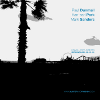
Dunmall-Park-Sanders (Birmingham, 02-15-11) [details…]
Performers: Paul Dunmall (saxophones and bagpipes), Han-earl Park (guitar) and Mark Sanders (drums).
(cc) 2013 Paul Dunmall/Han-earl Park/Mark Sanders.
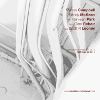
Gargantius Effect +1 +2 +3 (Nor Cal, 08-2011) [details…]
Performers: Murray Campbell (violins, oboe and cor anglais), Randy McKean (saxophone, clarinets and flutes) with Han-earl Park (guitar), plus Gino Robair (energized surfaces, voltage made audible) and Scott R. Looney (hyperpiano).
(cc) 2012 Murray Campbell/Randy McKean/Han-earl Park/Gino Robair/Scott R. Looney.

Park+Murray (Cork, 07-29-10) [details…]
Performers: Han-earl Park (guitar) plus Marian Murray (violin).
(cc) 2012 Han-earl Park/Marian Murray.

Jin-Park-Weeter (Cork, 01-24-11) [details…]
Performers: Jin Sangtae (electronics), Han-earl Park (guitar) and Jeffrey Weeter (drums and electronics).
(cc) 2012 Jin Sangtae/Han-earl Park/Jeffrey Weeter.
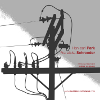
Park-Schroeder (Cork, 03-26-09) [details…]
Performers: Han-earl Park (guitar) and Franziska Schroeder (saxophone).
(cc) 2012 Han-earl Park/Franziska Schroeder.
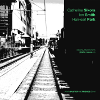
Sikora-Smith-Park (Cork, 04-04-11) [details…]
Performers: Catherine Sikora (saxophone), Ian Smith (trumpet) and Han-earl Park (guitar).
(cc) 2012 Catherine Sikora/Ian Smith/Han-earl Park.
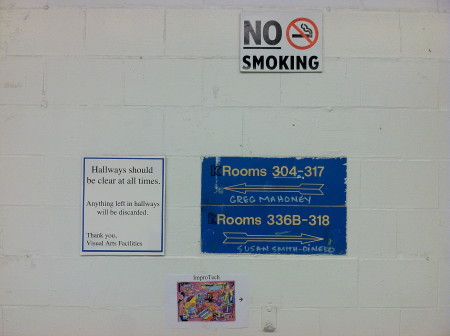
At the io 0.0.1 beta++ website, I’ve posted the twitter transcript of observations from a Computer Music event:
As a institutionally unaffiliated, part-time geek (and amateur anthropologist), I find the Computer Music tribes’ behavior fascinating. This is an unedited transcript of my observations from ImproTech Paris-New York 2012 : Improvisation & Technology series of events. My original observations came in the form of live tweets via @hanearlpark that spanned the performances on May 16, 2012 at the Roulette, and the ‘workshops’ (which I would describe as paper presentations or demonstrations) over the following two days at NYU and Columbia (the closing concert at Columbia gets a very short mention at the end).